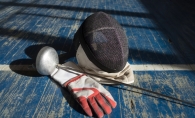While high school teams seem to get a lot of the attention in our area, there’s another basketball organization that’s racking up the buckets. The Minnetonka Girls Basketball Association (MGBA)—nicknamed “Tonka Buckets”—has been empowering young women and fostering a love for the sport since 1985. As one of the only independent, girls-only basketball associations in the state, it offers a unique opportunity—and a more serious level of play—to elementary and middle school girls.
Its younger teams are led by volunteer coaches, mostly parents, with professionals hired to coach grades seven and eight. For that matter, parents sit on the board, update the website, do promotional and event planning work, and help with games. “Because it’s run by parents, we have a lot of passion and we want to see it work for our kids,” says Lori Carver, who’s a mom of a player herself and director of marketing for MGBA. “It’s a really competitive program, but everyone still just wants to let kids play. We want the kids to be happy.”
With that in mind, teams make it a point to do things together outside of their twice-weekly practices and weekend game schedules. “They’re not just joining a travel group but joining a family,” Carver says. “The girls bond as teammates but also as friends. My son is a little jealous. He says, ‘Wow—they’re so tight.’ ”
When both of your parents have coached Minnetonka High School varsity basketball and you’re 5’10” at age 10, there’s a bit of an assumption that you’ll play basketball. For Emma Dasovich, the sport kind of came with the territory. Mom Leah coaches the girls’ high school varsity team, and dad Tom coached the boys’ varsity team before he stepped down to take an administrative position. But with no competitive school teams offered through the district for girls her age, she found a home on the fifth-grade blue team through MGBA.
“We tried when she was super-young to not push her to play, but she spent a lot of time in the gym with us growing up. She was naturally very curious about basketball,” Leah says. “She has a really good relationship with my high school kids—she’ll step in and play with them and not skip a beat.”
“At home we talk basketball—we do sets on the kitchen table with condiments and utensils; it’s basketball all the time in our house, especially in winter,” Leah says. The Dasoviches’ younger daughter is already picking up basketball terms and strategies at age 4. While Emma is certainly learning solid basketball skills, the social benefits of the club are what Leah is most excited about for her daughters. “Some of these girls Emma would not get to know if it weren’t for this. They hang out together. They volunteer together. Getting to know girls with similar interests is such a great benefit.”
So how does Emma feel about the time she spends practicing and playing with her MGBA team in her family’s favorite sport? “I like it. It builds teamwork. If you make a mistake, you have chances to do better,” she says. Emma loves to be part of the tight-knit team even when the pressure is high to do well. At times, she steps up and takes a bit of a leadership role among her teammates. “There are a couple people that are new to the team and don’t know all the plays—sometimes I try to explain plays to them on the court.”
She and her team make it a point to get together frequently off the court, even starting a book club (They suggest The Contract by Derek Jeter). “We try to get together as much as we can. Sometimes that’s tough, because we have crazy schedules!” Emma says.
Emma and her mom have both been noticing the non-basketball benefits of involvement on the team. They say that intensely focusing on the sport improves Emma’s attention span. Commitment to athletics builds healthy habits and discipline, and in the fast-paced sport of basketball, it’s essential that the girls learn to be patient with and listen to each other. Leah admits the program isn’t just great for her daughter, but also an excellent pipeline of high-quality players for the high school basketball program.
“We teach similar drills and language. They’ll see familiar faces and hear similar terminology if they decide to play in the varsity program,” Leah says. While she was asked early on if she would be interested in coaching Emma’s team, she says the decision to pass it up was an easy one.
“In winter, our [varsity] season is so intense, and we’re so competitive. I would not be able to give it my full attention if I were to coach her team. Plus, Emma hears enough from me at home. She needs another voice teaching her—and I need a break and time to just be Mom,” Leah says. She also appreciates the progression to professional coaches for the older teams. “It’s nice for kids to have a different voice. Sometimes they have the same mom or dad coaching them all the way through fourth or sixth grade. Having a professional coach then weans them off of the parents—it’s more like what high school will be like.”
The quality of the coaches and managers—who go through a special training program—makes it a little easier for the basketball-minded mom to stick to the sidelines. “We have a phenomenal group of parent volunteers—there’s not an agenda to further their own kids’ experience, but a genuine interest in improving the club for everyone,” Leah says. “They all want it to be fair and fun and an opportunity for all the girls to learn in an age-appropriate environment.”
While it’s not as involved as coaching, Leah and her staff do stay connected to the program, helping with summer clinics and try-outs. She also runs an “adopt-a-team” program where high school players attend a travel team’s practices, help them run drills, mentor younger players or simply play with them on-court. It’s a relationship that’s mutually beneficial.
“Kids love when the high school kids come,” says Carver. One annual favorite is the varsity team’s Youth Night, where MGBA players sit together in the stands, are recognized at halftime, and have a pizza party and poster autograph session with the high school athletes. “Kids get to know varsity players personally—and it’s so much more exciting to go and watch them play.”
MGBA travel basketball is open to girls in grades four through eight who live in the Minnetonka School District—and nobody “plays up” or “plays down.” That means even the most inexperienced or expert athletes will play with girls their own age and learn from and bond with peers; it’s distinctive among competitive basketball organizations. And because the district is so geographically large—with six elementary schools and two middle schools feeding into Minnetonka High School—the organization gives girls a unique chance to build friendships with girls outside of their schools. About 130 girls played MGBA ball this winter on 13 teams; Emma’s team included players from every elementary school in the district. Carver’s seventh-grade daughter, Claire, started playing with MGBA in fifth grade, and when she moved to middle school, she already had an entire network of friends from her team.
A unique facet of the program is that MGBA games are played tournament-style, with several games stacked during each tournament weekend. It frees up families’ weeknights a bit, and it’s possible for a team to have a whole weekend off and then a busy one with three or four concentrated games. “You could move up a lot in the standings in just one weekend,” Carver says. The tournaments happen across the Twin Cities metro, with one huge home event in December (teams win snow globes as trophies) and one in Rochester. For that destination tournament, teams go all-out with decorated hotel doors and family events.
In addition to the busy schedule of play, the association organizes trips to see professional games and, whenever possible, they like to support women’s pro teams. Carver says that seeing professional women—like the Minnesota Lynx—play on such a large stage generates excitement and reinforces a message that girls can work hard and go after their dreams.
“We love to show them they can move on to a high school, college or even a pro career—that girls can get paid to play a sport,” says Carver. “It’s inspiring.”









